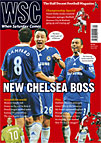 Everton and the BNP recently clashed over the timing of a party campaign. Mark O'Brien looks at how the police deal with disruptons to the matchday routine
Everton and the BNP recently clashed over the timing of a party campaign. Mark O'Brien looks at how the police deal with disruptons to the matchday routine
From the England team’s Nazi salute in 1938 to the T-shirts worn by Robbie Fowler and Steve McManaman in support of striking dockers, politics has frequently exerted an influence on football. That convergence caused quite some concern on Merseyside when the British National Party announced recently that they planned to conduct a leafleting campaign in Liverpool city centre on the afternoon of Saturday March 14, the same afternoon as Everton were scheduled to play host to Stoke City in the Premier League.Tranmere were at home to Huddersfield on the same afternoon, while Liverpool supporters would also be returning from their early game at Old Trafford, and according to Chief Superintendent Steve Watson of Liverpool North: “If they had all taken place at the same time it would have placed extraordinary pressures on demand and would have affected the ability to police those events effectively.”
The end result, when the BNP turned down an initial police request to reschedule, was that Everton were instead forced to move their game back 24 hours. This understandably upset the majority of supporters who rarely get a chance to enjoy matches at 3pm on a Saturday, but more specifically it disrupted the plans of those who had booked travel and accommodation, such as a large delegation from the Blues’ Isle of Man supporters’ club.
On February 22 though, the BNP did an about-turn, with their deputy leader Simon Darby announcing: “We’ve postponed [the leafleting campaign] as it was inconveniencing Everton and Stoke fans. The onus is back on police – if they can bring it forward at the drop of a hat, they can do it again.” And indeed the match was duly moved back, because, according to Ian Ross, Everton’s head of public relations: “Since the game was moved from Saturday to Sunday we have received numerous calls and emails from our supporters disappointed with the decision.We do understand their frustrations and when the police indicated they would permit the game to be played on the Saturday, we felt it was wholly appropriate to return the fixture to its original date.” Everton have also said that they will, where they can, reimburse those supporters who have been left out of pocket as a result of the game being switched back to the Saturday.
While this particular incident has been resolved more or less satisfactorily, Andy Burnham, the Everton-supporting secretary of state for culture, media and sport, believes there is a wider issue at stake. He said: “This sorry saga exposes the BNP for what they are. They’ve no regard whatsoever to the cost and inconvenience to football supporters when they refuse to change the date of their march and have now been forced to cave into media pressure. This must not set a dangerous precedent, allowing them to rock up to any given town and change a Premier League football fixture and ride roughshod over football supporters’ plans.”
Martin Wingfield, editor of the BNP newspaper, Freedom, takes issue, pointing out that his party’s small band of campaigners only planned to give out leaflets, and that: “The only march would have been one organised by the Labour Party and the myriad of anti-BNP groups that it funds itself or hands over public money to, to keep them going.” That doesn’t change the fact that the BNP could have avoided the whole issue by rescheduling their activities when originally asked.
There is now talk of new guidelines being issued to the Association of Chief Police Officers in anticipation of similar situations arising in the future. And given the amount of priceless column inches and airtime that the BNP have generated for themselves, it will surely come as no surprise to anyone if this becomes a cheap tactic employed again by activists, pressure groups and fringe political parties.
From WSC 266 April 2009